Key Takeaways
• Sustainability Demand: Clients increasingly require ESG metrics like EcoVadis ratings, making sustainability essential for business growth.
• EcoVadis Standard: The platform is emerging as a promotional products industry benchmark for supply chain sustainability, driven by major players like Staples Promotional Products (asi/120601).
• Assessment Challenges: Completing EcoVadis assessments may require extensive documentation and months of preparation, especially for smaller firms.
• Ongoing Commitment: Achieving and improving scores requires embedding sustainability into business operations and pursuing continuous improvement.
Last year, a prospective client asked New York City-headquartered Whitestone Branding (asi/359741) about their EcoVadis sustainability rating. The only thing was, Whitestone didn’t have one.
“They awarded us the order, but basically said that this will be the only and last order we get from them unless we take this seriously,” says Joseph Sommer, founder of Whitestone and the 2024 Counselor Distributor Entrepreneur of the Year. “We didn’t take it seriously.”

Sommer’s team went through the assessment process, submitted their paperwork to EcoVadis, but didn’t really dig into the necessary steps to lower their environmental impact. In March, Whitestone was awarded a “Committed” badge from the sustainability assessment platform, an acknowledgement that the distributor was at the beginning of its sustainability journey. Fast forward a few months to early summer, when Whitestone acquired a seven-figure account based in Europe, whose executives immediately started grilling Sommer on his company’s EcoVadis scores, how the distributor was measuring its carbon emissions and what it was doing to reduce and offset them.
“It quickly dawned on me that we needed to take this seriously,” Sommer says. “If it’s one customer asking this year, it’s going to be three next year, and it’s going to be 100 the year after.”
So, Whitestone spent the rest of 2024 playing catchup, changing company policy, assessing its carbon footprint through steps like home energy audits for its distributed, remote-first staff, becoming a member of 1% for the Planet and committing to quarterly workshop training for employees, among other steps. “We’re changing things in our business to weave sustainability into the fabric of our company,” Sommer adds.
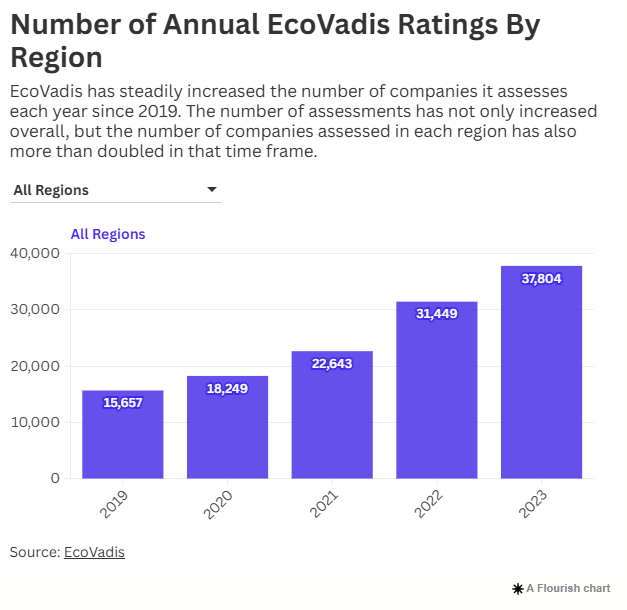
Whitestone is far from the only promo company being asked to provide concrete data about their carbon footprint and other environmental, social and governance (ESG) metrics – a phenomenon that ASI documented in the 2024 State of the Industry report. But among a sea of sustainability certifications and assessment tools, EcoVadis is increasingly becoming the industry standard when it comes to proving your company’s eco efforts. In fact, a few dozen promo companies have publicized their EcoVadis rating, including several Counselor Top 40 companies.
Still, very few within the promo industry know how EcoVadis works. This primer explains the EcoVadis process, why it’s been catching on in promo, and how suppliers and distributors new to the platform should approach it.
What Is EcoVadis?
EcoVadis says it provides “business sustainability ratings, intelligence and collaborative performance improvement tools for global supply chains.” A technology platform backed by subject matter experts, the company puts together actionable sustainability scorecards that it says provide insight into environmental, social and ethical risks for more than 220 industries.
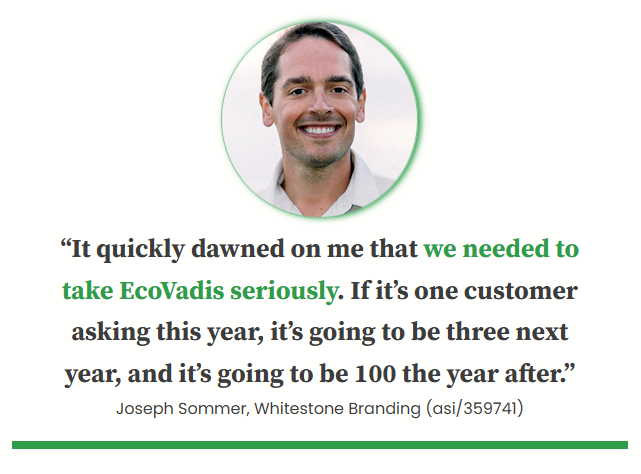
“When you first log into EcoVadis, it’s actually very confusing,” says Lindsay Hampson, president of Canada-based ThisRock, a sustainability and ESG consulting firm, which was recently named an approved training partner of EcoVadis. “There are so many questions and little caveats. You need a policy for every single thing in there. It can be overwhelming for smaller companies.”
Businesses must fill out a questionnaire and provide documentation on their policies, actions and results, within four key pillars.
- Environment: This examines a company’s environmental management practices, including things like energy consumption, greenhouse gas emissions, water usage and waste management.
- Labor & Human Rights: This pillar looks at working conditions, employee rights, compliance with labor laws, child labor prevention, as well as human rights standards in the company and throughout its supply chain.
- Ethics: EcoVadis assesses a company’s commitment to ethical business practices, with a focus on areas that include transparency, anti-corruption measures and compliance with relevant regulations.
- Sustainable Procurement: The final pillar looks at how companies integrate sustainability into procurement processes – evaluating how they select, engage with and monitor their vendors.
Companies receive a score from 1-100 for each pillar and an overall score from 1-100. Assessed companies that score above a certain cutoff may receive a badge or medal to highlight their accomplishment, though EcoVadis is quick to point out on its website that badges and medals are merely “an acknowledgement of achievement relative to other assessed companies across the EcoVadis database.” The assessment platform adds that a medal or badge is “not a certification or an endorsement of a company or its products or services, and it does not indicate that the company’s products or services are specifically more sustainable than another company’s products or services.”
EcoVadis scores are weighted by metrics like industry and company size to ensure they’re being compared against relevant peers. However, EcoVadis gives out medals to the top 35% of assessed companies, based on their overall ranking at the time of scorecard publication, and compared to all companies in its database over the previous 12 months. (EcoVadis says it has screened more than 2 million companies since its founding in 2007 and rated more than 130,000.)
Bronze medals denote companies in the top 35%, Silver medals are in the top 15%, Gold medals are in the top 5% and Platinum are in the top 1%. The platform also gives out two different badges for companies that haven’t qualified for medal status: Committed (for a minimum score of 45) and Fast Mover (for a score between 34-44 with a minimum six-point improvement compared to the previous assessment).
EcoVadis scores are valid for 12 months, with companies needing to reassess annually to be able to maintain or improve their sustainability ratings.
One thing that’s missing from the process, says Jing Rong, vice president of supply chain and sustainability at Counselor Top 40 supplier HPG (asi/61966), is the verification piece. EcoVadis provides a questionnaire and asks companies to supply their own documentation, but doesn’t require third-party audits, unlike standards like Sedex Members Ethical Trade Audit (SMETA) or the International Organization for Standardization (ISO), she says. Still, she adds of EcoVadis, “I think it’s definitely a step in the right direction.”
Why Is It Gaining Steam in Promo?
There are several reasons in the promotional products industry that EcoVadis is becoming more prevalent, one of which is the platform’s laser-focus on supply chain. Certifications like B Corp have cachet among retail consumers, but for many companies, pursuing B Corp certification can be complex and costly, and it’s not built for the supply chain, focusing more broadly on a company’s overall social and environmental performance, rather than being tailored for easy benchmarking between industries. “EcoVadis is set up to be a helpful tool in the supply chain,” Hampson says.
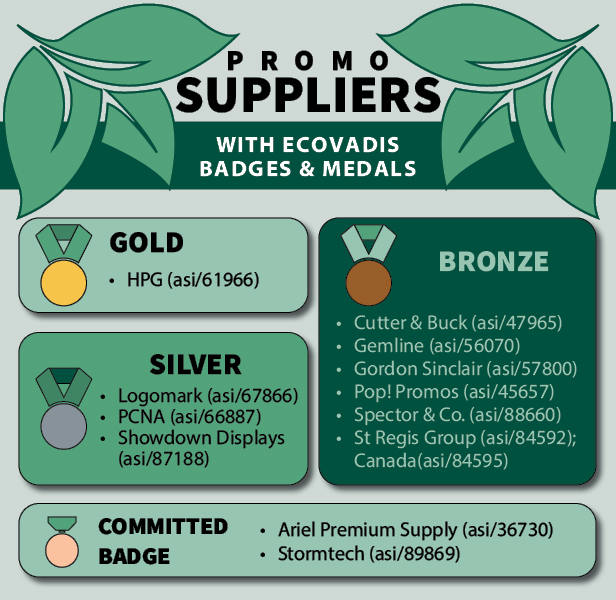
Rong, however, can boil down the rise of EcoVadis to one simple word: Staples. Or rather, Counselor Top 40 distributor Staples Promotional Products (SPP, asi/120601), which began asking industry suppliers for their scorecards a few years ago. “To be honest, because EcoVadis was able to sign up Staples, and Staples made this requirement for anybody who supplied to them, it basically became the standard,” Rong says.
Daron Hines, SPP president and a member of Counselor’s Power 50 list of the most influential people in promo, says that partnering with EcoVadis aligns with the distributor’s vision “to elevate sustainability transparency for every stakeholder in the branded merchandise value chain.”
“As the world’s most trusted provider of objective business sustainability assessments and ratings, EcoVadis uniquely has the scale, trust and relationships to enable our vision by uniting us and our supplier partners behind the same objective standards,” he adds.
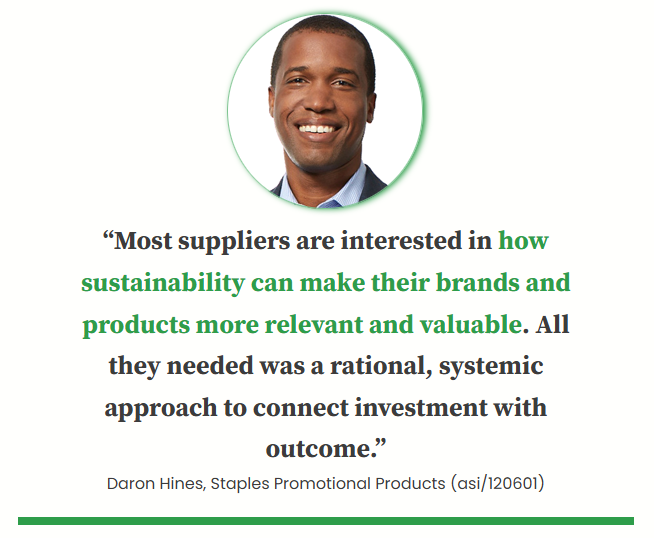
At the tail end of 2022, SPP launched a sustainable procurement platform, and the following year, the distributor began reporting its own EcoVadis score (and medal rating) as well as a composite EcoVadis score for its participating supplier partners. “Our supply chain strategy is heavily interconnected with our sustainability strategy, so partnering with suppliers who align on these shared goals, and then investing with them, has been key to our mutual success,” Hines says.
He adds that it was easier than he and his colleagues expected to convince suppliers to participate. “Most suppliers are interested in how sustainability can make their brands and products more relevant and valuable,” Hines says. “All they needed was a rational, systemic approach to connect investment with outcome.”
Aligning behind a common assessment platform is already yielding positive results. SPP shared in its most recent corporate social responsibility report that participating suppliers had improved an average of 11% when reassessed by EcoVadis in 2023. And Hines says that SPP is on track to meet its goal to have at least 70% of 2024 procurement spend with EcoVadis-assessed suppliers.

Hines believes a “tipping point is imminent” when it comes to supply chain sustainability data reporting. “As more suppliers and distributors adopt our model and undergo assessments,” he says, “a flywheel will develop, and the industry will begin converging around a single rating system to create the deeper sustainability documentation customers increasingly require.”
How Can Promo Firms Get on Board?
For companies that have already taken steps to calculate their carbon footprints and have robust social responsibility programs, taking on the EcoVadis questionnaire shouldn’t be too big of a hurdle. HPG, for example, went from a Bronze medal its first year of being assessed to its current Gold medal because the supplier took a more systematic approach to the process, outlining and backing up its ESG efforts with documentation on a dedicated web page, rather than everything being scattered across its site, Rong says. “We figured out what we did wrong the first time and cleaned up our documentation,” she explains.
Smaller firms – or ones that haven’t done any carbon accounting – may find EcoVadis more of a challenge. “EcoVadis has been very tailored toward the needs of large companies,” says Mike Smith, CEO and founder of Aclymate, a climate-accounting software solution targeted toward companies without on-staff sustainability experts. “Large companies need to know the footprint of their supply chains.”
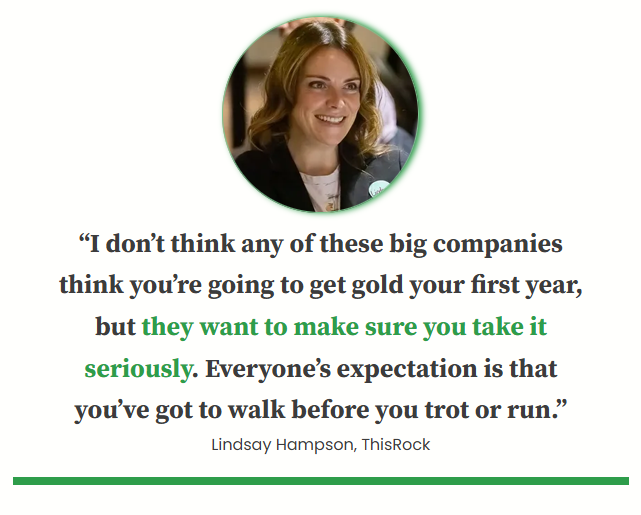
Rather than focusing on a specific certification like EcoVadis, Smith recommends working with a company like his that can help calculate your carbon footprint and develop strategies for reducing it. “Report your footprint, and then when a client says they need that data to fill into whatever certification or reporting standard they’re using, it won’t be that big of a deal,” he says. “Footprinting is a fairly standardized way of doing carbon accounting, so using a footprinting tool is probably going to get you what you need.”
Hampson recommends companies that are just starting out with sustainability carve out a good four to six months to work on completing an initial EcoVadis assessment. “More than 50% of clients I work with, the assessment is due in a week,” she says. “You can’t do this in a week.”
Hampson takes a three-phase approach to the process, first reviewing and assessing a business to see where the gaps are; then choosing a handful of areas to work on improving, whether that’s drafting a new employee policy or calculating baseline water, energy and waste generation numbers; and in the third phase, she and her client “lock it all down” in a short sustainability report as well as uploading results to EcoVadis.
“I don’t think any of these big companies think you’re going to get gold your first year, but they want to make sure you take it seriously,” she says. “Everyone’s expectation is that you’ve got to walk before you trot or run.”


